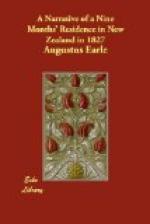When Captain Cook was in the Sound on his third voyage, he learned that the massacre arose over an unpremeditated quarrel. Kahura, who had been active in the tragedy, told Cook that a Maori having brought a stone hatchet to barter, the man to whom it was offered took it, and would neither return it nor give anything for it, and on which the owner snatched some bread from the party of Europeans, who were at dinner on the beach, as an equivalent, and then the quarrel began. Kahura himself had a narrow escape of being shot, while another was shot beside him; and the Europeans, outnumbered, were surrounded and killed. It was also stated by the natives that not one of the shots fired by the party of Captain Furneaux led by Mr. Burney to search for the missing people had taken effect so as to kill or even to hurt a single person.
APPENDIX II.
THE DEATH OF WHAREUMU (KING GEORGE).
The death of this Bay of Islands chief, who acted as protector to Mr. Earle during his residence at Kororareka, is thus described by Messrs. Hobbs and Stack, Wesleyan missionaries at Hokianga, in a letter dated from Mangungu, Hokianga, on the 22nd March, 1828:—
“On the same day that Hongi died at Whangaroa a son of the late Pomare’s, named Tiki, was killed at Waima by a chief of the tribe called Mahurihuri. Waima is in Hokianga, and only a few miles distance from us. The cause of the quarrel was this: Tiki had had some of his pigs stolen by the natives of Waima, and he was seeking utu by robbing their sweet potato plantations, for which he was shot.
“As soon as the report of the young man’s death reached the Bay of Islands, 400 natives collected together, forming two divisions, under two separate chiefs, Whareumu, or, as he is called by the Europeans, King George, and Toi, and came to Hokianga. Toi and his party arrived first at Waima, where he found Patuone and all the natives and other chiefs of our district. After robbing the natives of Waima of their potatoes, etc., peace was made, and no further evil consequences seemed likely to arise. The next day, the 14th, Whareumu and his party arrived. He was highly displeased with Toi for having made peace on such easy terms. He prevailed upon him, therefore, to break his league. Whareumu was also very insolent to Muriwai, intimated that he was a coward, and poured contempt upon the idea of the Hokianga natives standing in their own defence. On the morning of the 15th a quarrel ensued between the 400 Bay of Islanders and the natives of Waima, our natives also having now become their allies. This fray did not at the outset seem likely to be attended with fatal results, but, as Solomon justly observes, the beginning of strife is like the letting out of water; so it was in this instance. Shots were fired on both sides till several were killed and wounded. At length Muriwai, who was a pacificator, was wounded




